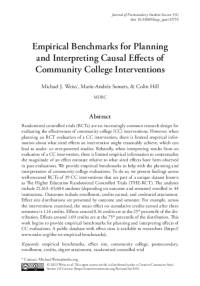Empirical Benchmarks for Planning and Interpreting Causal Effects of Community College Interventions

Randomized controlled trials (RCTs) are an increasingly common research design for evaluating the effectiveness of community college interventions. While the number of RCTs in community colleges has grown dramatically over the past 20 years, the information needed to plan a high-quality RCT and to interpret their findings in this context has not. When planning an RCT, it is important to consider the size of effect that the intervention might reasonably achieve. Researchers can use this information when setting a target sample size needed to ensure a study is adequately powered. Relatedly, when interpreting RCT findings, it is important for researchers to convey the practical significance of effect estimates to policymakers and practitioners to help inform their decision-making. In both scenarios, researchers need information that will help them consider what effect sizes are meaningful and policy relevant in the context of their study.
This paper, published in the Journal of Postsecondary Student Success, provides empirical benchmarks to help with the planning and interpretation of community college evaluations. To do so, the paper presents findings across well-executed RCTs of 39 community college interventions that are part of a unique dataset known as The Higher Education Randomized Controlled Trials (THE-RCT). The analyses include 21,163–65,604 students (depending on outcome and semester) enrolled in 44 institutions. Outcomes include enrollment, credits earned, and credential attainment. Effect size distributions are presented by outcome and semester. For example, across the interventions examined, the mean effect on cumulative credits earned after three semesters is 1.14 credits. Effects around 0.16 credits are at the 25th percentile of the distribution. Effects around 1.69 credits are at the 75th percentile of the distribution. This work begins to provide empirical benchmarks for planning and interpreting effects of community college evaluations. A public database with effect sizes is available to researchers.






